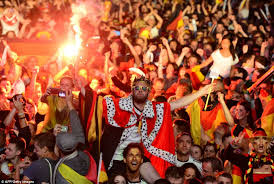By Andrew Warshaw
July 14 – If ever the expression ‘good things comes to those who wait’ is applicable to football, look no further than Germany’s thoroughly deserved World Cup triumph in the Maracana on Sunday night. A repetition of their semi-final humiliation of hosts Brazil was never likely against a resolute, spirited Argentina team who had the better chances yet didn’t record a single shot on target, Lionel Messi being one of the culprits.
Making history as the first European team ever to capture the biggest prize in world sport on South American soil was an historic achievement in itself. Substitute Mario Goetze’s stunning extra-time strike was worthy of winning any game, let alone arguably the best World Cup ever that brought to end a tournament in which the 171 goals matched the record at France ’98.
But the real success of Germany’s fourth World Cup triumph and the first since re-unification between east and west is not only because of the fact that the Germans had their own state-of-the-art training base in Brazil, and not only because of meticulous preparation. It was the culmination of a long-term programme of youth investment that started after the side failed to get past the group stages of both Euro 2000 and 2004 and prompted a major rethink by the national federation.
Many of the side that lifted the famous trophy amid scenes of wild euphoria in the Maracana, watched by around one billion people worldwide, have come up through the ranks together. As a result Germany made at least the semi-finals in the last two World Cups and European Championships and have now finally seen the programme of youth development bear fruit with the ultimate accolade as coach Joachim Loew – who took over from Juergen Klinsmann in 2006 and was coolness personified throughout the last month – acknowledged.
“I think that we were 50 days together but this is a project we started 10 years ago,” said Loew who has long been considered the coaching brains behind a model – pulling clubs and country together for the common cause – that other would-be footballing powerhouses, not least England, would be foolish to ignore.
Football is often cyclical and with an average age of 26, there is every likelihood that Germany’s wonderfully fresh and inventive squad, with so many inter-changing players, could dominate the game in years to come in the same way Spain did until their reign came to an abrupt end in the group stage in Brazil.
Loew explained how his players had come to learn not to rely simply on the traditional German virtues of determination and organisation. Domestically, young players also had to develop greater skills to compete with foreign stars. There is no greater example of this than Goetze whose outstanding technique symbolises the new generation, bolstered by such stalwarts such as skipper Philipp Lahm and the indefatigable Bastian Schweinsteiger.
“In 2004 German football was at the very bottom but we took some decisive steps,” Loew explained in the aftermath of victory. “We decided we had to invest more in education. We needed to produce players who were technically better. Having German virtues wasn’t enough because other teams had them too. We had to be better on the pitch.
“We have created centres of excellence which have brought results. I’m grateful for the clubs that have done that. This (World Cup triumph) is a product of the excellent training young players get.
“We started it with Juergen Klinsmann (after 2004) and then we continued it. Our biggest strength is that we improved throughout the years even if we missed taking that last step at tournaments. We were disappointed at times in the past but today there was only deserved winner. It is a special moment because it was not just these days here but the entire 10 years.
“The Bundesliga has a big part in this with its training centres. We took action to invest in training, to become technically better. The clubs also have their share in this because they got younger and younger players into the first teams.”
Even losing Sami Khedira in the warm-up on Sunday had little or no effect on the eventual outcome. His replacement Christoph Kramer had to be substituted himself after half an hour after taking a blow to the head and it is a hallmark of Germany’s current strength in depth that HIS replacement, Andre Schurrle, ultimately created the winning goal for Goetze.
“We have lots of good players who are very young,” said Loew. “Mario Goetze, Marco Reus, Sami Khedira, Andre Schurrle and Toni Kroos are all young players who will be around for many years to come.”
Germany’s victory saw them equal Italy as four-time winners. Only Brazil, destroyed by the Germans in the semi-final and well beaten again by the Dutch in the third-place playoff on Saturday, have won more.
It was also Germany’s first World Cup triumph since 1990, when Franz Beckenbauer’s team also defeated Argentina – at Rome’s Stadio Olimpico. “I believe we were the best team for seven matches here,” said Loew. “We have developed a team spirit which is unbelievable. The players have a marvelous technical capacity and the will to carry it out. We are the first European team to win the World Cup in the Americas and to do it in Brazil, the home of football, makes us proud.”
Hailing Goetze as a “boy wonder”, Loew revealed he had told the 22-year-old from Bayern Munich during half-time in extra time that he could surpass Messi as the star of the show. “I said to him: ‘OK, show the world that you are better than Messi and can decide the World Cup. You have the potential to do just that.’ I had a good feeling about him.”
Contact the writer of this story at moc.l1745176237labto1745176237ofdlr1745176237owedi1745176237sni@w1745176237ahsra1745176237w.wer1745176237dna1745176237

